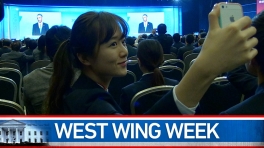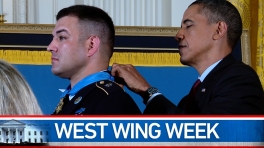Science & Technology
Speech in Cairo | Expanding Opportunity | Science & Technology | Democracy & Human Rights | Interfaith Engagement | Timeline
In response to the President’s call to expand opportunities in science, technology, health, and innovation in Muslim-majority countries and with Muslim communities, departments across the government have launched or facilitated numerous programs during the past year that expand partnerships in the fields of science and technology.
Global Technology and Innovation Fund: In response to President Obama’s Cairo speech last June, the Overseas Private Investment Corporation (OPIC) launched the global technology and innovation call for privately managed investment funds in October 2009. The Funds will make investments in start up and growth oriented companies in the telecommunications, media, and technology sectors. Some Funds will utilize a “technology transfer” strategy by importing existing technology in developed countries to increase innovation and efficiency in sectors such as healthcare, education, and infrastructure. In addition, the Funds will promote the economic and social development of the target countries. With the private sector capital catalyzed by OPIC, these Funds will have the potential to mobilize over $2 billion in private equity capital for Muslim-majority countries. All Funds remain subject to review and approval of OPIC’s Board of Directors. Learn more at the Office of Science and Technology Policy.
U.S. Science Envoy Program: This program sends prominent U.S. scientists overseas to identify opportunities for new partnerships in science and technology. The first three envoys, Dr. Ahmed Zewail, Dr. Elias Zerhouni, and Dr. Bruce Alberts, have traveled across the world, from Saudi Arabia, Kuwait, Qatar, Algeria, Tunisia, and Indonesia. Read the U.S. Science Envoy Fact Sheet to learn more.
Environment, Science, Technology, and Health Officers: The Secretary of State announced a commitment to expand ESTH Officer positions at Embassies as a way of advancing the State Department’s ability to engage with international partners on the full range of environmental, scientific and health issues, from climate change and the protection of oceans and wildlife to cooperation on satellites and global positioning systems. Learn more at http://www.state.gov/g/oes/hub.
Online Youth Network: Kansas to Cairo: Listening sessions were conducted with more than 80 NGOs, technology companies and foundations. The mission of Kansas to Cairo is to catalyze and expand partnerships that enable young Americans to communicate with Muslims around the world using a variety of technologies. This will be done through a two-tiered approach involving the expansion of existing online programs and the development of innovative trans-lingual online communications technologies.
Global Pulse 2010: USAID held an online collaboration event called Global Pulse 2010, which allowed nearly 7,000 participants from around the world to discuss key issues facing their communities. Global Pulse had 10 discussion forum topics, and the most active forum was Empowering Women and Girls. The Empowering Women and Girls forum hosted spirited discussions, and generated a range of ideas and insights about possible ways to change the status of women’s rights around the world. Participants posted 1,620 times, on topics such as women and technology, the meaning of empowerment, the use of media and empowerment, and improving education and training for women. Read more on the Global Pulse 2010 (pdf).
Bilateral and Regional Efforts: We have also strengthened bilateral partnerships on science and technology, and our embassies abroad have helped develop and implement programs focused on expanding scientific collaboration. Examples include:
- The U.S. signed a MOU on renewable and alternative energy with King AbdulAziz City for Science and Technology (KACST) in Saudi Arabia, and a MOU on Clean Energy Cooperation with the United Arab Emirates.
- The U.S. helped establish the Gulf Nuclear Energy Infrastructure Institute in the UAE and a Middle East Energy Efficiency Center in Jordan.
- The U.S. signed Science and Technology Agreements with Kazakhstan and Indonesia.
- The Environmental Protection Agency has partnered with the City of Jakarta to improve air quality and human health.


